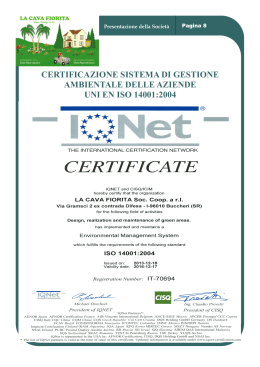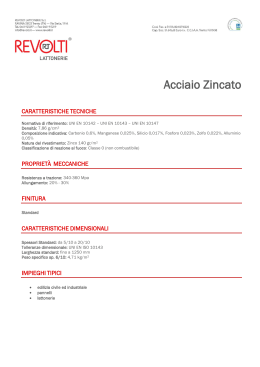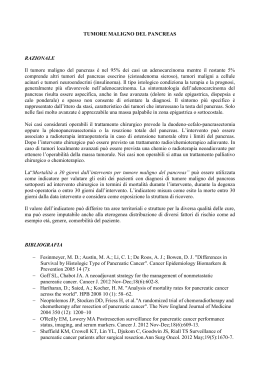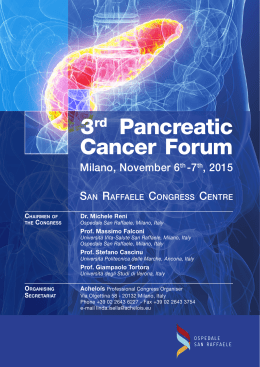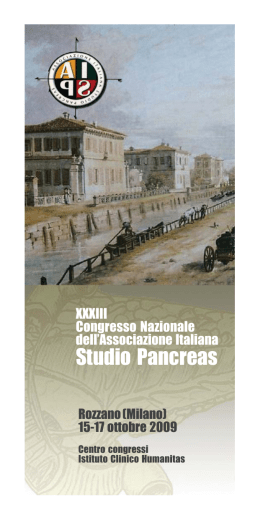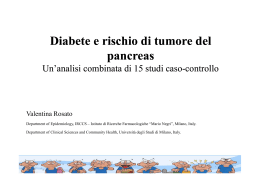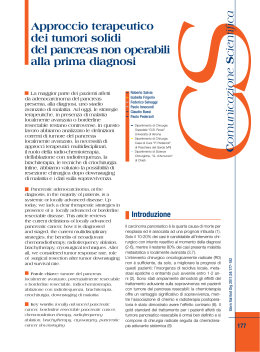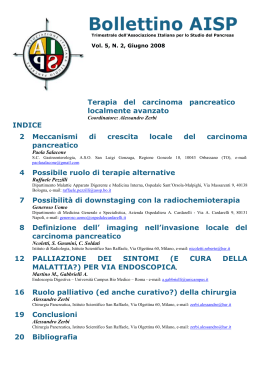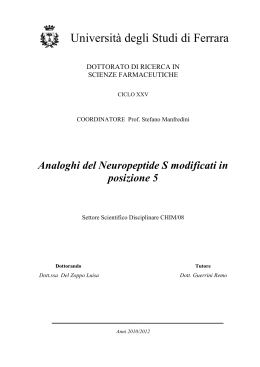Dipartimento di Chimica e Farmacia Università di Sassari Istituto di Chimica Biomolecolare del CNR di Sassari Comitato Scientifico: Prof. Paolo Scrimin Prof. Raffaele Riccio Prof. Roberto Ballini Prof. Valeria Conte Prof. Marco D’Ischia Prof. Gianluca Farinola Prof. Francesco Sannicolò Conferenze Plenarie: Dott. Catia Bastioli, Matrìca/Novamont Dott. Walter Cabri, Indena Prof. Cinzia Chiappe, Uni Pisa Prof. Antonella Dalla Cort, Uni Roma1 Prof. Bartolo Gabriele, Uni Calabria Prof. Cesare Gennari, Uni Milano Prof. Andrea Mazzanti, Uni Bologna Dott. Alessandro Mordini, CNR Firenze Prof. Carmen Nàjera, Uni Alicante Dott. Vincenzo Palermo, ISOF CNR Bologna Dott. Stefano Protti, Uni Pavia Dott. Haymo Ross, EurJOCWiley Prof. Claudio Trombini, Uni Bologna Dott. Antonio Zanotti-Gerosa, JohnsonMatthey Comitato Organizzatore: Prof. Ugo Azzena Dott. Massimo Carraro Dott.ssa Giovanna Delogu Dott.ssa Lidia De Luca Dott. Davide Fabbri Dott. Mauro Marchetti Dott.ssa Luisa Pisano Dott. Andrea Porcheddu Dott.ssa Gloria Rassu Dott. Pietro Spanu Dott. Pietro Allegrini P45 Targeted Nanoparticles for the Delivery of Novel Bioactive Molecules to Pancreatic Cancer Cells 1,2 1 Vanna Sanna, 1Nicolino Pala, 1Salvatore Nurra, 3Salvatore Marceddu, 4Divya Pathani, 4 Nouri Neamati, 1Mario Sechi Department of Chemistry and Pharmacy, Laboratory of Nanomedicine, University of Sassari, Italy; 2Porto Conte Ricerche, Alghero, Italy; 3Istituto di Scienze delle Produzioni Alimentari (ISPA), CNR, Sezione di Sassari, Italy; 4Dept. Pharmacol. & Pharmaceutical Sciences, University of Southern California, Los Angeles, USA [email protected] Pancreatic cancer (PaCa) is a multifaceted disorder with an extremely poor prognosis. There is an urgent need to identify new and safe drugs as well as to develop novel tumor-targeted controlled release systems for effective treatment of late stage and resistant PaCa. Active targeting via the inclusion of specific ligands on the nanoparticles (NPs) is envisioned to provide a powerful therapeutic strategy (1). In this context, identification of ligand/receptor systems that enable functionalized NPs efficiently target the pancreatic ductal adenocarcinoma (PDAC) holds great promise for the development of novel approaches for treatment of PaCa. Plectin-1 (Plec-1) was recently identified as specific biomarker to detect PDAC at an early stage (2). Moreover, multivalent attachment of small molecular entities can increase specific binding affinity and high specificity for PaCa cells (3). On the other hand, altered cellular bioenergetics and oxidative stress are emerging hallmarks of many types of cancer including pancreatic cancer. Cancer cells are more prone to reactive oxygen species (ROS)mediated cell death due to their inherent elevated basal oxidative stress as compared to normal cells. In this scenario, we have recently discovered a novel class of potential PaCa therapeutics (i.e., DFCs compounds) that exert their cytotoxic effects by modulating ROS-mediated cell signaling (4). Herein, we present a study on the design and the development of novel DFCencapsulated biocompatible polymeric NPs, functionalized with peptides to selectively bind to Plec-1 (PTP), or densely decorated by low molecular weight organic molecules as alternative targeting ligands (2-ABA), and evaluated a) the impact on ligand binding and b) the in vitro antiproliferative efficacy against a panel of PaCa cells. (1) Farokhzad, O.C.; Langer, R. ACS Nano 2009, 3, 16-20 (2) Bausch, D.; Thomas, S.; Mino-Kenudson, M.; Fernández-del, C.C.; Bauer, T.W.; Williams, M.; Warshaw, A.L.; Thayer, S.P.; Kelly, K.A. Clin. Cancer. Res. 2012, 17, 302-309 (3) Weissleder, R.; Kelly, K.; Sun, E.Y.; Shtatland, T.; Josephson, L. Nat. Biotechnol. 2005, 23, 14181423 (4) Pathania, D.; Sechi, M.; Palomba, M.; Sanna, V.; Berrettini, F.; Sias, A.; Taheri. L.; Neamati. N. Biochim. Biophys. Acta (General Subjects), 2013, submitted
Scaricare
